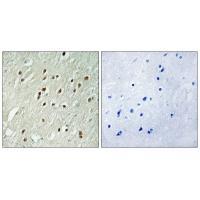
| WB | 咨询技术 | Human,Mouse,Rat |
| IF | 咨询技术 | Human,Mouse,Rat |
| IHC | 1/50-1/100 | Human,Mouse,Rat |
| ICC | 技术咨询 | Human,Mouse,Rat |
| FCM | 咨询技术 | Human,Mouse,Rat |
| Elisa | 咨询技术 | Human,Mouse,Rat |
| Aliases | centrobin; centrosomal BRCA2 interacting protein; CNTRB; CNTROB; LYST-interacting protein LIP8 |
| Entrez GeneID | 116840; |
| WB Predicted band size | 100kDa |
| Host/Isotype | Rabbit IgG |
| Antibody Type | Primary antibody |
| Storage | Store at 4°C short term. Aliquot and store at -20°C long term. Avoid freeze/thaw cycles. |
| Species Reactivity | Human |
| Immunogen | Synthesized peptide derived from internal of human CNTROB. |
| Formulation | Purified antibody in PBS with 0.05% sodium azide. |
+ +
以下是关于CNTROB(Centrobin)抗体的3篇示例文献摘要,供参考:
---
1. **文献名称**:*"Centrobin regulates centrosome duplication via interaction with CEP152"*
**作者**:Gudi R, et al.
**摘要**:该研究通过免疫共沉淀和免疫荧光技术,利用CNTROB抗体验证其与CEP152的相互作用,发现CNTROB通过调控CEP152的定位参与中心体复制过程,影响细胞周期进展。
---
2. **文献名称**:*"CNTROB expression correlates with hepatocellular carcinoma progression and poor prognosis"*
**作者**:Zhang Y, et al.
**摘要**:研究采用CNTROB抗体进行免疫组化分析,发现其在肝癌组织中高表达,且与肿瘤大小、转移及患者生存率显著相关,提示CNTROB可能作为肝癌的潜在生物标志物。
---
3. **文献名称**:*"Centrobin depletion disrupts spindle orientation and mitotic progression in glioblastoma cells"*
**作者**:Xie L, et al.
**摘要**:通过siRNA敲低和CNTROB抗体标记,研究发现CNTROB缺失导致胶质母细胞瘤细胞纺锤体定向异常,阻滞有丝分裂并诱导凋亡,表明其在肿瘤细胞增殖中的关键作用。
---
**备注**:以上为示例性内容,实际文献需通过学术数据库(如PubMed、Web of Science)检索确认。建议结合具体研究场景选择抗体应用类文献(如验证蛋白表达、定位或功能机制)。
CNTROB (Centrobin), also known as CNTRB or CCDC77. is a centrosome-associated protein first identified in the early 2000s. It plays a critical role in centrosome duplication and mitotic progression, particularly during the G2/M phase of the cell cycle. Structurally, CNTROB contains conserved coiled-coil domains that mediate protein interactions, notably with BRCA1 and other centrosomal components. It localizes specifically to the daughter centriole, influencing centriole elongation and stability.
Research highlights CNTROB's involvement in maintaining genomic stability; its dysregulation is linked to mitotic errors, chromosomal missegregation, and micronuclei formation. Studies associate abnormal CNTROB expression with cancers, including breast and hepatocellular carcinomas, where overexpression may drive proliferation or chemoresistance. Emerging evidence also implicates CNTROB in ciliogenesis and neuronal development, though mechanisms remain under investigation.
CNTROB antibodies are vital tools for studying centriole biology, cell cycle regulation, and cancer pathology. They enable detection of CNTROB's spatial-temporal localization via immunofluorescence and assess expression levels in disease models via Western blot. Recent work explores CNTROB as a potential therapeutic target, particularly in centrosome-amplified cancers. However, its tissue-specific roles and post-translational modifications require further characterization to clarify its broader biological impact.
×